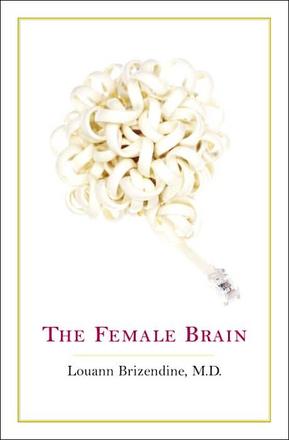For the past 40 years neuroscientist Louann Brizendine has been studying the differences between male and female human brains and in the process has washed away centuries of archaic views on how female brain chemistry works. Until relatively recently it was assumed by psychologists that men’s larger brain size meant that men were the superior sex. “For much of the 20th century,” Brizendine states, “(t)hat assumption has been at the heart of enduring misunderstandings about female psychology and physiology.” According to Brizendine, men and women’s brain chemistries are vastly different, men’s being glacially slow and severe like geology, women’s being swift and unpredictable like the weather.
Brizendine introduces the cast of neurochemical and hormonal characters at work in the female brain. The ones behind feminine behavior (estrogen and progesterone) and the ever changing cocktail that influence more complex behavior (testosterone and oxytocin) and how they all play a role in shaping the perspective of a woman and thus, her reality. The purpose of this book is to grasp an understanding of how a woman’s brain chemistry can shape the way she sees the world. For example, a source of great fear and anxiety for a woman is the possibility loosing a dear friend or being ostracized by a peer group or network of friends. Brizendine posits that this fear is activated by ancient brain wiring telling the female that she needs her group of female friends in order to band together to protect themselves from aggressive males or any other potential threat.
The book is structured through the different developmental stages of a woman’s life (birth and girlhood, the teenage years, love and sexual development, motherhood and eventually menopause) and tracks the chemical and hormonal changes taking place during those pivotal times. Brizendine says that brain wiring is essentially scrapped and new wiring is made at each of these transitional times, radically changing who a woman is. She illustrates points through cases of patients she treats at the Women’s Mood and Hormone Clinic, part of UC San Francisco’s psychiatry department. She goes on to say that most women who come to see her don’t really know why they feel like either bursting into tears or blighting someone’s head off. “If we acknowledge that our biology is influenced by other factors,” Brizendine states, “including out sex hormones and their flux, we can prevent it from creating a fixed reality by which we are ruled.”
If Brizendine can be criticized for anything it’s coming from this place of slight disdain for they way men are. According to Brizendine, our testosterone-soaked brains make us problematic. We’re terse and aggressive and cruel, but we can’t help it cause our brains are soaked in testosterone. While scientifically the testosterone levels may be true, this perspective seems like a fundamentally ignorant place to start from. She mentions talents that come natural to women like, “a nearly psychic ability to read faces and tone of voice for emotions and states of mind,” are not talents that men, by and large, are capable of possessing. The brain being an infinitely complex and mysterious organ, it’s hard to believe that such talents couldn’t be learned or explored but Brizendine’s hardline stance doesn’t allow for that.
If you love women, but they drive you crazy sometimes, you need to read this book. If you don’t love women because they drive you crazy, you need to read this book. Also, you probably don’t love yourself for some reason and you should probably look into that.






















